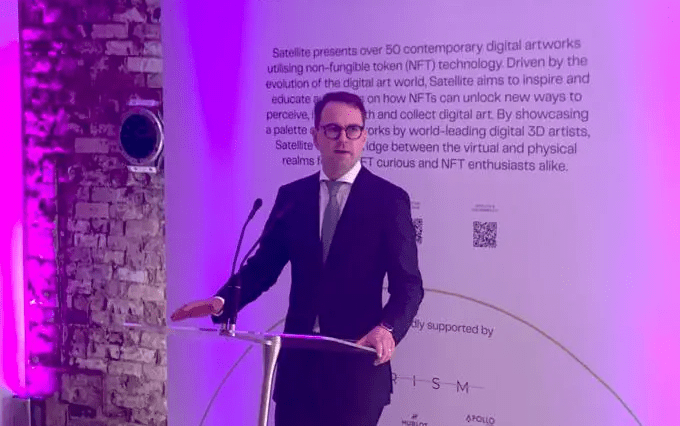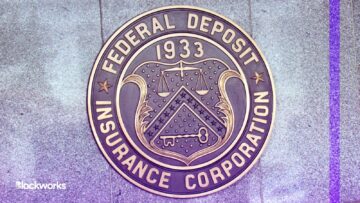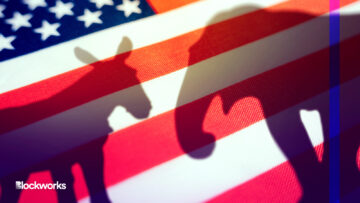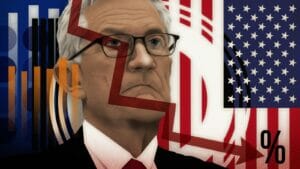
- Speaking at Sydney’s premiere 3D NFT Art exhibit, Liberal Party Senator Andrew Bragg said NFTs provided a platform for physically remote artists to digitally connect with audiences
- Bragg also said policy relating to NFTs and digital assets needed to be implemented quickly to stave off a potential “brain drain” on Australia’s economy
Australian Senator Andrew Bragg told a gathered crowd at Sydney’s “first” 3D art NFT exhibition “Satellite” on Tuesday the country needed to hear from artists on the best way forward for digital asset regulation.
The Senator said artists benefit from the technology inherent in NFTs that allowed for those living in the country’s most remote regions to connect to larger audiences. He also said work was being to be done to understand their value and ensure Australia remained competitive in attracting local and foreign talent.
NFTs or non-fungible tokens are digital assets based on blockchain technology that provide proof of authenticity and ownership over physical or virtual goods. They are typically distributed, bought and sold on marketplaces such as OpenSea and Rarible.
In a sideline interview with Blockworks, Bragg said the event provided a “humanising way” for the discussion of NFTs while also highlighting the additional value blockchain provides to artists.
“I think this [NFTs] can do what royalties have done for singers,” Bragg said pointing to various artworks and their accompanying QR codes throughout the exhibit.
“Blockchain is going to allow artists to be paid over the course of their life.”

“NFTs are relatively new and certainly have only taken off in any meaningful way in the last year, so we are still in the discovery phase,” said Martha Reyes, Head of Research at digital asset exchange and prime broker Bequant.
“NFTs are not a one-trick pony; they will have multiple applications that we are only just figuring out.”
The event, which runs until April 3, features 50 curated pieces of digital artworks from 27 artists including Jonathan Zawada, Boss Logic, David McLeod, Serwah Attafuah, Yambo, Trevor Jones and Beeple.
While federal grants to artists and the arts sector are provided annually, Senator Bragg said the method was unsustainable with NFT policy needing to be established to set “guardrails” for the economy to be the driver and for artists not to have to rely on “handouts from Canberra.”
Regulatory Landscape
Elected to the country’s senate in 2019, Bragg currently chairs the “Environment and Communications Legislation Committee” and is the deputy chair of the “Environment and Communications References Committee.”
The Senator also chaired the “Australia as a Technology and Financial Centre Committee” from Sept. 19, 2019, through to October 20, 2021. That committee was the first of its kind examining, among other topics, how businesses and individuals operating in the domestic crypto industry interact with the traditional financial sector.
The committee heard several cases of financial institutions denying or terminating banking services to crypto businesses often with no explanation given while also finding regulation around the nascent asset class to be fragmented and inadequate by today’s standards.
While crypto regulation in the country has historically been slow, the committee, argues Bragg, — along with a proposal by Treasurer Josh Frydenburg to create a national stablecoin — show the government is attempting to quicken the pace.
The new policy framework up for debate and consideration includes a licensing regime for crypto exchanges as well as custody rules for digital assets that extract heavily from the committee’s findings last year.
Yet some still criticise the government’s approach to regulation as potentially leading the country toward a “weird limbo state” that would do more harm than good.
One source speaking under the condition of anonymity at the event said regulation, as it relates to artists and NFTs, was a poorly understood patchwork of “politically motivated” and “outdated” policy.
Their gripe lay in the lack of interest from politicians on both sides of the aisle to pursue issues important to the younger generation, they said. The source also took aim at those in parliament who were “ready and willing” to “toe the line” of “business as usual” mandates that they said prop up big banks at the expense of financial innovation.
Still, despite the criticism, Bragg said the government was pushing on with its digital asset agenda.

Bragg also said he and the ruling Liberal party were hoping to extend on research already conducted in prior committees as well as through stakeholder engagement and policy reformation, especially where NFTs were concerned.
He said tax restructuring and clear guidance was needed to counter local firms looking to establish themselves in more favourable jurisdictions overseas including in Singapore and the UK.
“At the moment, I think there are cases where NFT’s are being taxed inadvertently,” said Bragg.
“There’s no real transfer of value. We want to make sure that we’re not doing that — we need to make sure that we’re tax competitive,” he added. “Otherwise, why would you do business here?”
With a yet to be called Federal election looming potentially weeks away, the stakes for reaching niche audiences and markets could not be any higher. And while the government says it is working hard to get its digital asset policy just right, critics argue it may be too late, especially when it comes to currying favour with millennials already heavily invested in digital assets and disinterested in national politics.
Get the day’s top crypto news and insights delivered to your inbox every evening. Subscribe to Blockworks’ free newsletter now.
The post NFTs ‘Inadvertently’ Taxed Says Australian Senator During Sydney Art Exhibit appeared first on Blockworks.
- "
- 2019
- 2021
- 3d
- Additional
- already
- among
- Annually
- Anonymity
- applications
- approach
- April
- around
- Art
- Artists
- Arts
- asset
- Assets
- audiences
- Australia
- authenticity
- Banking
- Banks
- being
- Bequant
- BEST
- blockchain
- blockchain technology
- broker
- business
- businesses
- cases
- Communications
- condition
- consideration
- could
- country
- crypto
- Crypto Exchanges
- Crypto Industry
- Crypto News
- curated
- Custody
- debate
- Despite
- digital
- Digital Asset
- Digital Assets
- digitally
- discovery
- distributed
- driver
- economy
- Election
- engagement
- Environment
- especially
- establish
- established
- Event
- exchange
- Exchanges
- extend
- Features
- Federal
- financial
- Financial institutions
- Financial sector
- First
- Forward
- Framework
- Free
- going
- good
- goods
- Government
- grants
- head
- here
- hoping
- How
- HTTPS
- implemented
- important
- Including
- industry
- Innovation
- insights
- institutions
- interest
- Interview
- issues
- IT
- jurisdictions
- larger
- leading
- Legislation
- Licensing
- local
- looking
- Markets
- Media
- Millennials
- most
- National
- news
- NFT
- NFTs
- non-fungible
- non-fungible tokens
- OpenSea
- operating
- Other
- otherwise
- paid
- parliament
- phase
- physical
- platform
- policy
- politics
- proof
- proposal
- provide
- provides
- quickly
- RE
- Regulation
- remained
- research
- rules
- Said
- sector
- Senate
- Senator
- set
- Singapore
- So
- sold
- stablecoin
- standards
- sydney
- Talent
- tax
- Technology
- The Source
- Through
- throughout
- Tokens
- top
- Topics
- traditional
- Uk
- understand
- value
- Virtual
- What
- WHO
- Work
- working
- year












